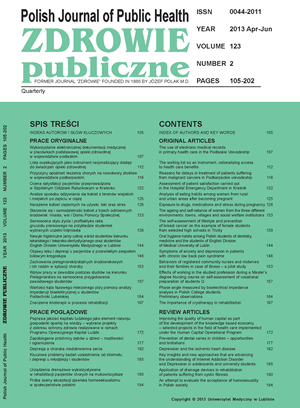Behaviors of registered community nurses and midwives and their families in case of illness – a pilot study
DOI:
https://doi.org/10.12923/j.0044-2011/123-2/a.11Keywords:
registered community nurses/midwives, illness, compliance, self-treatmentAbstract
Introduction. Community nurses and midwives who perform their work mainly in patients’ houses are subjected to many occupational hazards that frequently may lead to a disease, which next can be spread to their relatives, coworkers or patients. Therefore, the proper behavior of nursing staff in case of their own disease can be important for health of their environment.
Aim. The present pilot study investigates the behavior of registered community nurses and midwives and their families in situation of illness.
Material and methods. The investigation was performed with the use of anonymous questionnaires among the nursing staff in Bychawa region (Poland).
Results. Behavior of community nurses and midviwes and their relatives in case of their illnes was similar – it included visiting a doctor and the use of pharmacotherapy, however sometimes without following all doctor’s orders and doing necessary check-ups. Frequent behavior was the use of OTC, first of all painkillers, vitamins and antipyretics but at times antibiotics as well.
Discussion. Community nurses and midwives and their families sometimes do not behave properly in case of own disease – they sometimes do not follow the physician’s orders, for instance they do not undergo necessary check-ups and use drugs for self medication, among them antibiotics without necessary doctor’s prescription and supervision. This can make more difficult their correct diagnosis and treatment and may also have negative consequences on the public health, e.g. it can cause resistance to antibiotics
Conclusions. The introduction of measures to improve the behavior of medical personnel in the event of illness, especially in the use of the doctor’s recommendations is an important task for the organizers of health care in Poland.
References
1. Kulagowska E, Kosinska M. Working conditions of community nurses. Med Pr. 2010;61(6):641-7.
2. Smit R. HIV/AIDS and the workplace: perceptions of nurses in a public hospital in South Africa. J Adv Nurs. 2005;51:22-9. Review match
3. Kowalczuk K. Krajewska-Kułak E. Ostapowicz-van Damme K. Hazard and dangerous factors in nurses and midwives work. Probl Pieleg. 2010;18(3):353-7.
4. Wilczynska U, Szeszenia-Dąbrowska N. Occupational diseases among health and social workers in Poland. Med Pr. 2010;61(6):597-605.
5. Yang P. Seale H, MacIntyre CR. Mask-wearing and respiratory infection in healthcare workers in Beijing, China. Braz J Infect Dis. 2011;15(2):102-8. Review match
6. Zyznawska J, Cwiertnia B, Madetko R. Pieleg Chir Angiol. 2011;2:54-9.
7. Breier-Mackie S. Cultural competence and patient advocacy: the new challenge for nurses. Gastroenterol Nurs. 2007;30(2):120-2. Review match
8. Lewis R, Yarker J, Donaldson-Feilder E, et al. Using a competency-based approach to identify the management behaviours required to manage workplace stress in nursing: a critical incident study. Int J Nurs Stud. 2010;47(3):307-13. Review match
9. Omeri A, Malcolm P. Cultural diversity: a challenge for community nurses. Contemp Nurse. 2004;17(3):183-91. Review match
10. DiMatteo, M. Robin. Variations in Patients’ Adherence to Medical Recommendations: A Quantitative Review of 50 Years of Research. Medical Care. 2004;42(3):200-9. Review match
11. Kardas P, Devine S, Golembesky A, Roberts C. A systematic review and meta-analysis of misuse of antibiotic therapies in the community. Int J Antimicrob Agents. 2005;26:106-13. Review match
12. Macintyre CR. Patient knows best: blinded assessment of nonadherence with antituberculosis therapy by physicians, nurses, and patients compared with urine drug levels. Prev Med. 2005;40:41-5. Review match
13. Chen C, Chen YM, Hwang KL, et al. Behavior, attitudes and knowledge about antibiotic usage among residents of Changhua, Taiwan. J Micro¬biol Immunol Infect. 2005;38(1):53-9.
14. Okumura J, Wakai S, Umenai T. Drug utilisation and self-medication in rural communities in Vietnam. Soc Sci Med. 2002;54(12):1875-86. Review match
15. Kardas P. Misuse of antibiotics – mistakes made by doctors, pharmacists and patients. Fam Med Prim Care Rev. 2006;8(3):947-54.
16. Pechere JC. Patients interviews and misuse of antibiotics. Clin Infect Dis. 2001;33(3):170-3.


